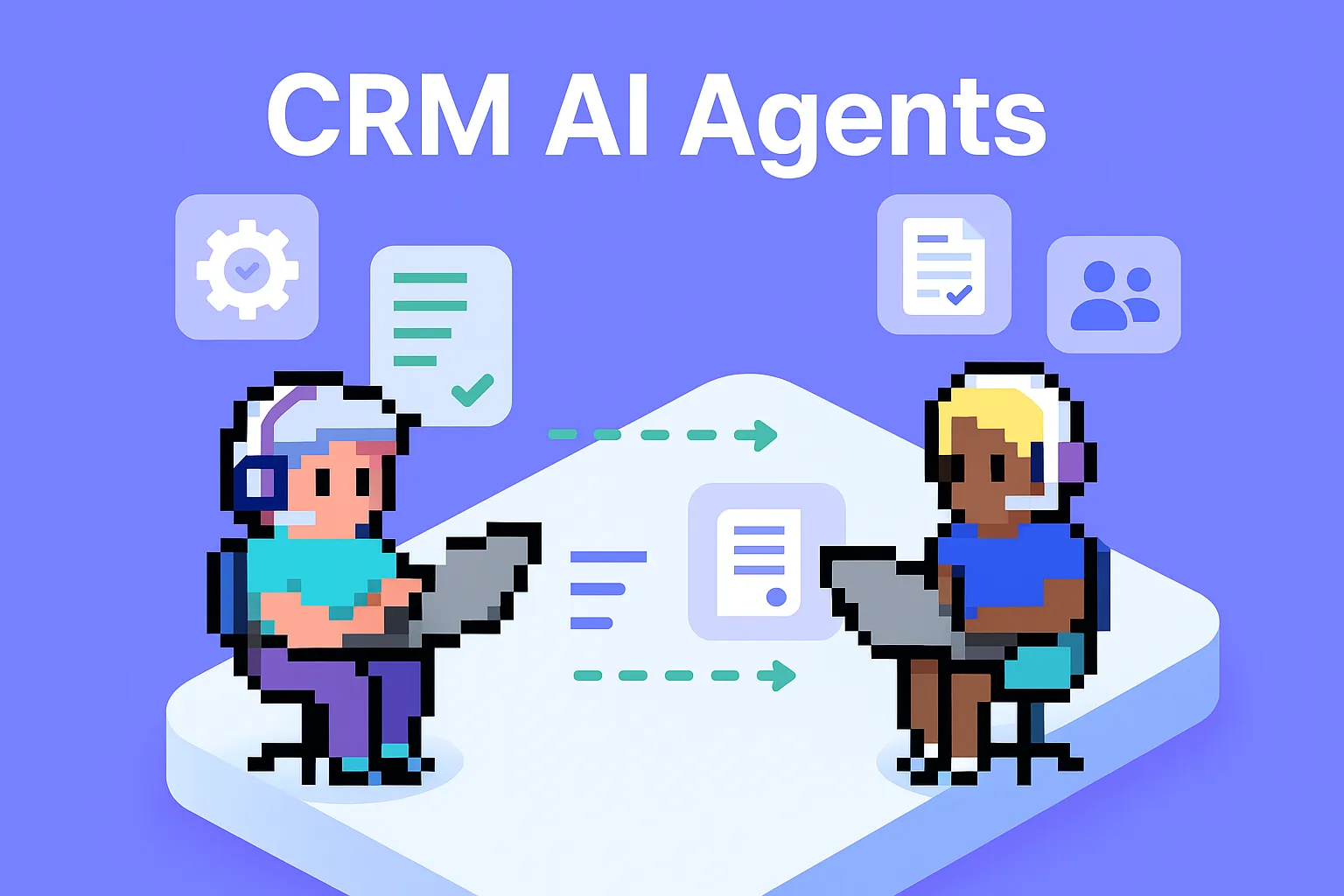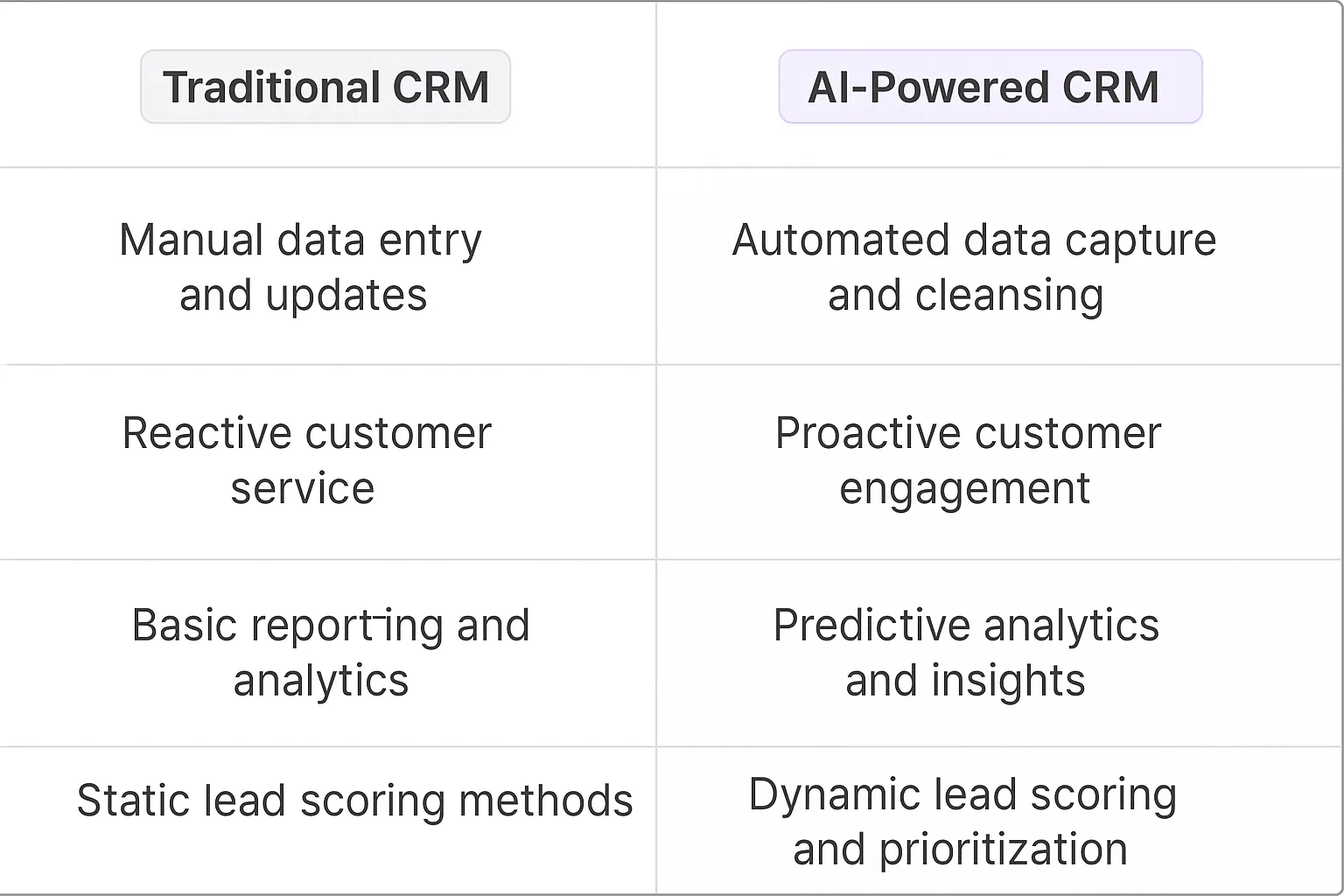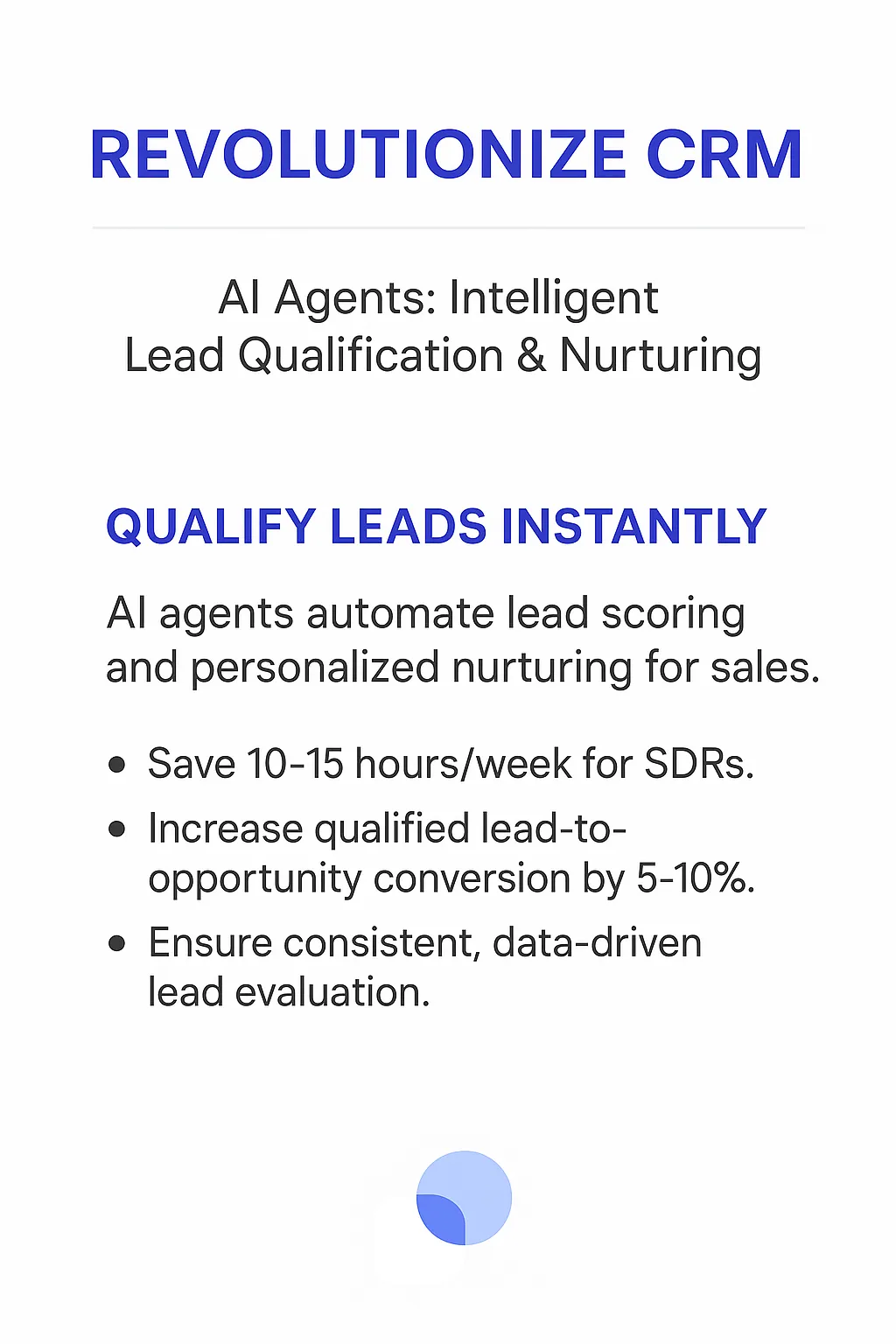CRM AI Agents
The Evolution of CRM: From Static Databases to Intelligent Systems
Customer Relationship Management (CRM) is the backbone of modern business interactions. It's a technology for managing all your company's relationships and interactions with customers and potential customers. But in its traditional form, CRM systems were often more of a digital Rolodex than a true relationship management tool. They required manual input, offered limited insights, and frequently became outdated faster than last year's iPhone.
Traditional CRM systems typically include contact management, sales management, productivity, and reporting. They store customer and prospect contact information, identify sales opportunities, record service issues, and manage marketing campaigns. However, these features often relied heavily on human input and interpretation, leading to inconsistencies and missed opportunities.
Enter AI agents - the game-changers that are transforming CRM from a passive data repository into an active, intelligent system. These digital teammates are redefining what's possible in customer relationship management. They're not just storing data; they're analyzing it, predicting outcomes, and taking proactive actions to drive sales and improve customer satisfaction.
AI agents in CRM can automate data entry, provide real-time insights, predict customer behavior, personalize communications at scale, and even handle complex tasks like lead scoring and churn prediction. They're turning CRM systems into powerful tools that can anticipate customer needs, streamline sales processes, and provide actionable intelligence to sales teams.
This fusion of CRM and AI is creating a new paradigm in how businesses interact with customers. It's enabling companies to operate with a level of efficiency and personalization that was previously unimaginable, setting the stage for a new era of customer relationship management.

Benefits of AI Agents for CRM
What would have been used before AI Agents?
Before AI agents entered the CRM scene, sales teams were drowning in a sea of manual data entry, endless follow-up tasks, and missed opportunities. The typical CRM workflow involved reps painstakingly logging every interaction, deciphering customer signals through gut instinct, and relying on static playbooks that couldn't adapt to the nuances of each deal.
It was like trying to navigate a complex maze with a map from the 1800s – technically possible, but wildly inefficient and prone to errors. Sales managers spent more time chasing data quality issues than actually coaching their teams. The result? A CRM that was more of a burden than a benefit, with adoption rates that made even the most optimistic sales leaders cringe.
What are the benefits of AI Agents?
Enter AI agents – the secret weapon that's transforming CRMs from glorified spreadsheets into intelligent deal-closing machines. These digital teammates are like having a team of elite sales analysts working 24/7, but without the astronomical payroll or coffee budget.
First off, AI agents are crushing the data entry game. They're automatically capturing and categorizing customer interactions across channels, freeing up reps to focus on what they do best – building relationships and closing deals. It's like having a personal assistant with perfect recall and typing speed that would make even the fastest court stenographer jealous.
But the real magic happens in the insights department. These AI agents are pattern-recognition ninjas, spotting trends and opportunities that would take humans weeks to uncover. They're analyzing vast troves of historical data, current market conditions, and individual customer behaviors to serve up actionable intelligence. Imagine having a crystal ball that not only predicts which deals are most likely to close but also suggests the optimal next steps to get there.
For sales managers, AI agents are the ultimate force multiplier. They're providing real-time coaching suggestions, flagging at-risk deals before they go south, and even helping to optimize territory assignments. It's like having a seasoned sales mentor whispering in your ear, but one that never sleeps and is always up-to-date on the latest industry trends.
Perhaps most importantly, AI agents are turning CRMs into proactive deal accelerators rather than reactive data repositories. They're automating follow-ups, personalizing outreach at scale, and even predicting customer needs before they arise. It's the difference between playing checkers and three-dimensional chess – suddenly, sales teams are operating on a whole new level of strategic sophistication.
The bottom line? AI agents are doing for CRMs what the smartphone did for mobile communication. They're not just incrementally improving the process; they're fundamentally redefining what's possible in sales execution and customer relationship management. And for companies that embrace this shift, the competitive advantage is going to be nothing short of game-changing.

Potential Use Cases of AI Agents with CRM Systems
Processes
AI agents are reshaping how we interact with CRM systems, turning them from passive data repositories into proactive digital teammates. These agents can handle complex, multi-step processes that traditionally required significant human intervention. Let's dive into some game-changing use cases:
- Lead Qualification and Scoring: AI agents can analyze incoming leads, cross-reference them with historical data, and assign accurate scores. They'll consider factors like engagement history, company size, and industry fit, providing sales teams with a prioritized list of high-potential prospects.
- Customer Segmentation and Personalization: By crunching vast amounts of customer data, AI agents can create nuanced segments based on behavior patterns, preferences, and lifecycle stage. This enables hyper-personalized communication strategies that resonate with each group.
- Sales Forecasting: AI agents can generate accurate sales forecasts by analyzing historical data, current pipeline, and external factors like market trends. They'll continuously refine predictions as new data comes in, giving sales leaders a real-time view of expected performance.
- Churn Prediction and Prevention: By monitoring customer interactions, product usage, and support tickets, AI agents can flag accounts at risk of churning. They'll then suggest tailored retention strategies based on what's worked for similar customers in the past.
Tasks
Beyond high-level processes, AI agents excel at handling numerous day-to-day CRM tasks. Here's where they're making waves:
- Data Entry and Cleansing: AI agents can automatically populate CRM fields from emails, call transcripts, and web forms. They'll also continuously scan for and correct inconsistencies, ensuring your CRM stays clean and up-to-date without manual effort.
- Meeting Scheduling and Follow-ups: These digital teammates can handle the back-and-forth of scheduling, finding optimal times based on everyone's calendars. Post-meeting, they'll create summary notes and set reminders for action items.
- Email Drafting and Personalization: AI agents can craft personalized email templates for different customer segments or stages in the sales process. They'll pull relevant details from the CRM to make each message feel tailored and timely.
- Competitive Intelligence Gathering: By scouring the web and social media, AI agents can keep sales teams informed about competitors' moves, pricing changes, and new product launches. This real-time intel gets automatically added to relevant CRM records.
The beauty of these AI-powered use cases is their ability to learn and improve over time. As they interact with more data and receive feedback, these digital teammates will become increasingly valuable members of your sales and marketing teams. They're not replacing humans, but rather augmenting our capabilities, allowing us to focus on high-value, strategic work that truly moves the needle.

Industry Use Cases for CRM AI Agents
The versatility of AI agents in CRM systems is reshaping how businesses interact with customers across various sectors. These digital teammates are not just add-ons; they're becoming integral to the customer relationship lifecycle. Let's dive into some industry-specific scenarios where CRM AI agents are making waves:
From tech startups to enterprise giants, companies are leveraging these AI-powered tools to decode customer behavior, predict needs, and deliver personalized experiences at scale. The impact is profound - we're seeing sales cycles compress, customer satisfaction scores soar, and retention rates climb. But it's not just about the metrics. These AI agents are freeing up human talent to focus on high-value, creative tasks that machines can't replicate.
What's particularly exciting is how these use cases are evolving. We're moving beyond simple automation to true augmentation of human capabilities. The best implementations don't just mimic human interactions; they enhance them in ways we're only beginning to understand. As we explore these examples, keep in mind: we're just scratching the surface of what's possible when AI meets CRM.
Real Estate: Transforming Client Relationships with CRM AI Agents
The real estate industry is ripe for disruption, and CRM AI agents are poised to be the game-changers. Think about it: real estate agents juggle dozens of clients, each at different stages of the buying or selling process. It's a high-touch, high-stakes game where personalization and timing are everything.
Enter CRM AI agents. These digital teammates can analyze vast amounts of data to predict which properties a client is most likely to be interested in, based on their browsing history, past purchases, and even social media activity. But that's just the beginning.
Imagine an AI agent that can automatically schedule viewings based on a client's calendar and preferences, or one that can answer complex questions about property values, neighborhood trends, and mortgage rates at any time of day. This isn't just about efficiency; it's about creating a seamless, personalized experience that feels magical to the client.
The real power comes from the AI's ability to learn and adapt. As it interacts with more clients and closes more deals, it becomes increasingly sophisticated in its recommendations and communication strategies. It might notice that certain types of properties tend to sell faster in specific neighborhoods during particular seasons, and adjust its strategies accordingly.
But here's the kicker: these AI agents aren't replacing real estate agents. They're augmenting them, freeing up human agents to focus on the high-value, emotionally intelligent aspects of the job that AI can't replicate. The result? A real estate industry where agents can handle more clients, close more deals, and provide a level of service that was previously impossible.
This is just the tip of the iceberg. As these AI agents become more sophisticated, we could see them start to predict market trends, identify up-and-coming neighborhoods before they boom, and even negotiate deals on behalf of clients. The real estate industry is about to get a lot more interesting, and a lot more competitive.
E-commerce: CRM AI Agents Redefining Customer Relationships
The e-commerce landscape is cutthroat, with razor-thin margins and fickle customers. But what if you could turn every interaction into a personalized shopping experience that rivals the best boutiques? That's where CRM AI agents are changing the game.
These digital teammates are like having a million personal shoppers working 24/7. They're not just tracking clicks and purchases; they're decoding the DNA of customer behavior. An AI agent can spot patterns in browsing habits, correlate them with purchase history, and even factor in external data like weather or local events to predict what a customer might need before they know it themselves.
But here's where it gets really interesting: these AI agents are learning to speak 'human'. They're crafting product recommendations that feel less like algorithms and more like advice from a trusted friend. They're timing these suggestions perfectly - maybe right after payday, or just before a big holiday.
The real magic happens in the long game. These AI agents are building relationships over time, remembering every interaction, every abandoned cart, every wishlist item. They're creating a digital version of the old-school shopkeeper who knew every customer by name and could recommend the perfect gift for their spouse.
And let's talk about churn prevention. These AI agents are becoming savants at detecting when a customer is about to drift away. They can trigger perfectly timed interventions - a personalized discount, a reminder of past positive experiences, or even a nudge to try a new product line that aligns with their tastes.
But don't think this is just about pushing more products. The smartest e-commerce players are using these AI agents to create genuine value for customers. Imagine an AI that notices you always buy sunscreen in May, so it reminds you in April and suggests a new, highly-rated brand. Or one that notices you've been browsing office chairs and sends you a guide on ergonomics.
This isn't replacing human customer service - it's augmenting it. When a customer does reach out to a human, that rep is armed with an incredible wealth of context and insights, allowing for much more meaningful interactions.
The e-commerce brands that master this AI-driven personalization at scale are going to leave their competitors in the dust. They'll create loyal customers who feel truly understood and valued, not just marketed to. And in a world of endless choices, that emotional connection is going to be the ultimate differentiator.
Considerations
Technical Challenges
Implementing CRM AI agents isn't a walk in the park. It's more like trying to teach a robot to dance salsa while juggling flaming torches. The first hurdle? Data integration. Your CRM is probably a hodgepodge of customer interactions, sales pipelines, and support tickets. Getting an AI to make sense of this data soup is like asking it to solve a Rubik's cube blindfolded.
Then there's the AI model itself. You can't just slap a generic language model onto your CRM and call it a day. It needs to be fine-tuned on your specific business context, industry jargon, and customer quirks. This isn't just about feeding it data; it's about teaching it the subtle art of not pissing off your VIP clients.
Let's not forget about real-time processing. Your sales team needs answers now, not after their coffee's gone cold. Building an AI that can think on its feet without melting your servers is a delicate balancing act.
Operational Challenges
On the operational front, you're basically asking your team to adopt a new digital teammate. And let's face it, not everyone's thrilled about working with R2-D2. There's a learning curve steeper than San Francisco's Lombard Street.
Training is crucial. Your team needs to understand how to work with the AI, what it can do, and more importantly, what it can't do. It's not a magic wand; it's more like a very smart, occasionally glitchy intern.
Then there's the trust factor. How do you get your sales reps to trust AI-generated insights? It's like convincing a cat to trust a robot vacuum cleaner. It takes time, proof, and probably a few treats.
Governance is another can of worms. Who's responsible when the AI makes a mistake? How do you ensure it's not inadvertently sharing sensitive information? You need a rulebook thicker than "War and Peace" to cover all the what-ifs.
Lastly, there's the ever-present challenge of ROI. Implementing AI isn't cheap, and CFOs aren't known for their patience. You need to show results faster than a TikTok video, or your shiny new AI project might end up in the corporate graveyard alongside that office hoverboard idea.
The Future of Intelligent Customer Relationship Management
The integration of AI agents into CRM systems marks a pivotal shift in how businesses manage customer relationships. We're moving from reactive, data-heavy systems to proactive, intelligent platforms that can predict needs, automate complex tasks, and provide unprecedented insights.
The benefits are clear: increased efficiency, improved customer satisfaction, and the ability to scale personalized interactions. From real estate to e-commerce, industries are finding innovative ways to leverage these digital teammates to create more meaningful customer connections.
However, the path to implementation is not without its challenges. Technical hurdles like data integration and model fine-tuning, coupled with operational issues such as team adoption and governance, require careful navigation.
Despite these challenges, the potential rewards are too significant to ignore. As AI technology continues to evolve, we can expect CRM AI agents to become even more sophisticated, further blurring the line between human and machine capabilities in customer relationship management.
The future of CRM is intelligent, proactive, and deeply personalized. Companies that successfully harness the power of AI agents in their CRM strategies will likely find themselves with a significant competitive advantage in the years to come. The question is no longer if businesses should adopt AI-powered CRM, but how quickly they can implement and master these game-changing tools.













